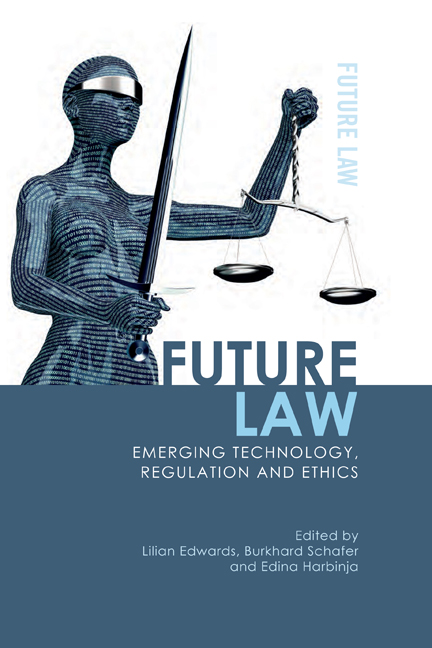Book contents
- Frontmatter
- Contents
- List of Contributors
- List of Figures and Tables
- Table of Cases
- Table of Legislation
- 1 The Future’s Already Here: It’s Just Unevenly Edited
- Part I From Privacy and Princesses, to Security and Star Wars
- 2 Privacy and Identity through the Eyes of Disney Princesses
- 3 White Noise from the White Goods? Privacy by Design for Ambient Domestic Computing
- 4 Citizen-consumers in a Personalised Galaxy: Emotion-influenced Decision Making, a True Path to the Dark Side?
- 5 Big Data Ethics: Darth Vader and the Green Cross Man
- 6 Security Vulnerabilities, Backdoors, Exploits and the Marketplace for Each: The Return of Boba Fett – Bug Bounty Hunter in the New Republic
- Part II A Matter of (Future) Life and Death
- 7 Will My Genes Really Help Me Fit Into Those Jeans? Personal Genomics and Wrap Contracts
- 8 On Living and Undead Wills: ZombAIs, Technology and the Future of Inheritance Law
- 9 ‘Be Right Back’: What Rights Do We Have over Post-mortem Avatars of Ourselves?
- Part III Regulating Autonomous Technologies: Software Are Doing it for Themselves
- 10 Autonomous Intelligent Agents and the Roman Law of Slavery
- 11 Autonomous Vehicles: An Analysis of the Regulatory and Legal Landscape
- Part IV Textual Poaching: Copyright in a Remixed World
- 12 Living in a Remixed World: Comparative Analysis of Transformative Uses in Copyright Law
- 13 Repost This: Instagram and the Art of Re-photography
- Index
5 - Big Data Ethics: Darth Vader and the Green Cross Man
Published online by Cambridge University Press: 17 September 2020
- Frontmatter
- Contents
- List of Contributors
- List of Figures and Tables
- Table of Cases
- Table of Legislation
- 1 The Future’s Already Here: It’s Just Unevenly Edited
- Part I From Privacy and Princesses, to Security and Star Wars
- 2 Privacy and Identity through the Eyes of Disney Princesses
- 3 White Noise from the White Goods? Privacy by Design for Ambient Domestic Computing
- 4 Citizen-consumers in a Personalised Galaxy: Emotion-influenced Decision Making, a True Path to the Dark Side?
- 5 Big Data Ethics: Darth Vader and the Green Cross Man
- 6 Security Vulnerabilities, Backdoors, Exploits and the Marketplace for Each: The Return of Boba Fett – Bug Bounty Hunter in the New Republic
- Part II A Matter of (Future) Life and Death
- 7 Will My Genes Really Help Me Fit Into Those Jeans? Personal Genomics and Wrap Contracts
- 8 On Living and Undead Wills: ZombAIs, Technology and the Future of Inheritance Law
- 9 ‘Be Right Back’: What Rights Do We Have over Post-mortem Avatars of Ourselves?
- Part III Regulating Autonomous Technologies: Software Are Doing it for Themselves
- 10 Autonomous Intelligent Agents and the Roman Law of Slavery
- 11 Autonomous Vehicles: An Analysis of the Regulatory and Legal Landscape
- Part IV Textual Poaching: Copyright in a Remixed World
- 12 Living in a Remixed World: Comparative Analysis of Transformative Uses in Copyright Law
- 13 Repost This: Instagram and the Art of Re-photography
- Index
Summary
Introduction
What do the Green Cross Man, who helps children cross the road in 1970s road safety films, and Darth Vader, lord of the dark side, have in common? The answer is that they were played by the same very tall actor, David Prowse. What do the Green Cross Man, Darth Vader and big data have in common? They’re big. Big data analysis has great potential for improving lives, but is putting on a strain on the principles that underlie privacy laws. This chapter is about taming big data's scary Darth Vader-like aspects, to make it more like the helpful Green Cross Man.
One commonly used definition of big data is Gartner’s, which does not set a minimum volume, but specifies them as ‘high-volume, high-velocity and/or high-variety information assets that demand cost-effective, innovative forms of information processing for enhanced insight and decision making’. The type of data analysis I had in mind when developing the code of practice was investigations, by teams of data scientists using dedicated analytic tools, of data sets including data about hundreds of thousands of individuals (or more).
The basis of the chapter is work that I have done with several teams on developing ethical guidelines for big data analysis. The sectors involved were high technology, health care, marketing and government; these are all sectors in which big data analysis can play an important role. Like the Green Cross Man (who promoted the Green Cross Code for pedestrian safety), we aimed to improve others’ safety through a code of practice. The content of this chapter was developed through discussions with many people, however it reflects my personal opinions, not necessarily those of anyone else involved. I did this work while employed in industry, at a US multinational company: my employer was one of the organisations involved.
A survey by Krista Bondy et al. of 390 codes of conduct for corporations found that the most common reported voluntary motivations for the codes were as a guide for behaviour, or to formalise expected behaviours and commitments; to protect and enhance reputation, or to create and maintain trust and confidence with stakeholders; to have a consistent framework across a global network; and for various forms of compliance.
- Type
- Chapter
- Information
- Future LawEmerging Technology, Regulation and Ethics, pp. 131 - 148Publisher: Edinburgh University PressPrint publication year: 2020

